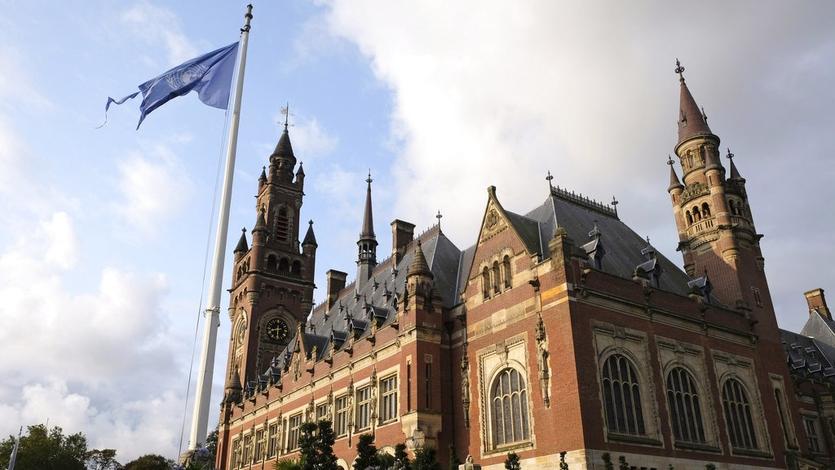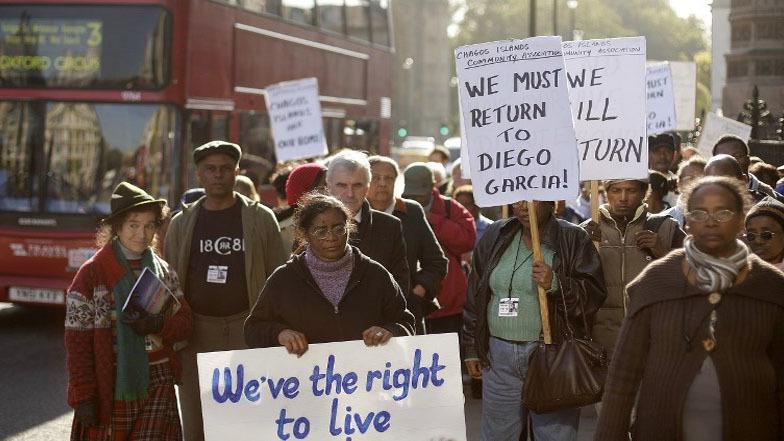 In this Aug 27, 2018, image, the United Nations flag flutters in the wind next to the International Court of Justice in the Hague, the Netherlands. The legality of Britain's claim to the Chagos Islands in the Indian Ocean, which house a major US military base, will be considered by the International Court of Justice on Sept 3, 2018 when it starts a week of hearings. (MIKE CORDER / AP)
In this Aug 27, 2018, image, the United Nations flag flutters in the wind next to the International Court of Justice in the Hague, the Netherlands. The legality of Britain's claim to the Chagos Islands in the Indian Ocean, which house a major US military base, will be considered by the International Court of Justice on Sept 3, 2018 when it starts a week of hearings. (MIKE CORDER / AP)
THE HAGUE - The legality of Britain's claim to the Chagos Islands in the Indian Ocean, which house a major US military base, will be considered by the International Court of Justice on Monday when it starts a week of hearings.
Mauritius has said it was unfairly pressured to cede control of the islands during the negotiations, and had agreed only to their temporary use for military purposes
Britain has overseen the islands since 1814 and in 1965 detached the Chagos Islands from Mauritius, a British colony that became independent three years later.
Britain went on to lease the Chagos Islands’ biggest island, Diego Garcia, to the United States in 1966, paving the way for construction of an air base that required the forced removal of around 1,500 people.
Mauritius has said it was unfairly pressured to cede control of the islands during the negotiations, and had agreed only to their temporary use for military purposes.
Mauritius petitioned the United Nations for an International Court of Justice opinion on the legality of Britain's possession of Chagos.
Britain and the United States opposed the demand, but were voted down by the UN general assembly. Britain is expected to argue that Mauritius is trying to improperly use the International Court of Justice or "World Court" to settle abilateral dispute.
More than 20 interested parties, including the US and the African Union, have asked to take part in the hearings.
“These things come together now in a combination of historical accident and intense political and popular interest in questions of colonial legacy," international law expert Geoff Gordon of the Asser Institute in The Hague, said.
The World Court will ultimately issue only an "advisory opinion" on the case, but opinions by the United Nations' highest court can carry significant weight in international law.
The people displaced from the Chagos Island have already lobbied to be able to return. But in 2016, Britain's Foreign Ministry extended Diego Garcia's lease until 2036 and declared the expelled islanders would not be allowed to return.
 In this file photo taken on Oct 22, 2008 Chagos Islanders hold placards reading "we must return to Diego Garcia" "we've right to live", during a demonstration outside the London's Houses of Parliament, after British government won its appeal to Britain's highest court over previous rulings that allowed displaced Indian Ocean islanders to return home. (SHAUN CURRY / AFP)
In this file photo taken on Oct 22, 2008 Chagos Islanders hold placards reading "we must return to Diego Garcia" "we've right to live", during a demonstration outside the London's Houses of Parliament, after British government won its appeal to Britain's highest court over previous rulings that allowed displaced Indian Ocean islanders to return home. (SHAUN CURRY / AFP)
The people from Chagos were originally moved to nearby Mauritius and the Seychelles and effectively barred from returning. Many eventually settled in southern England.


